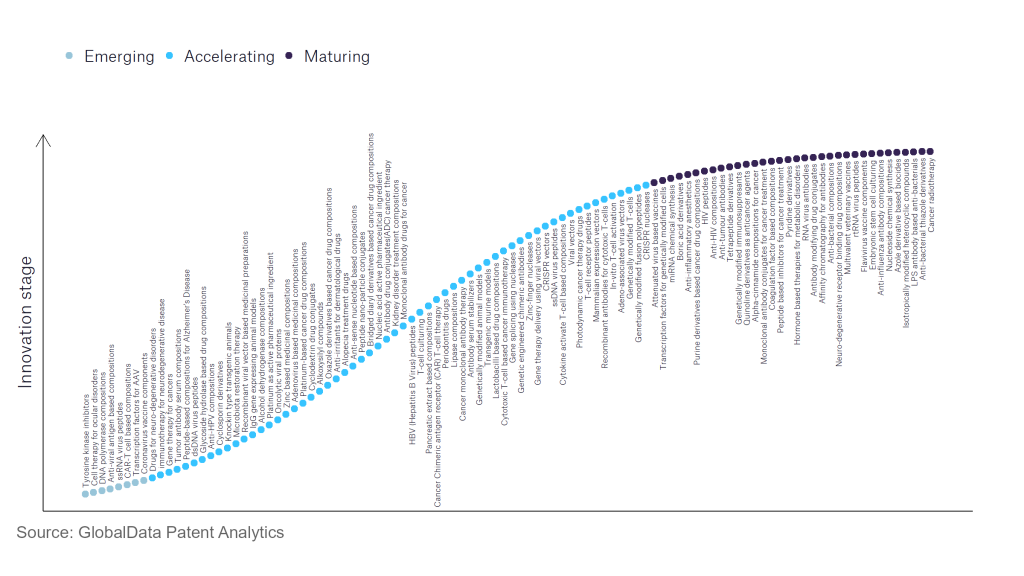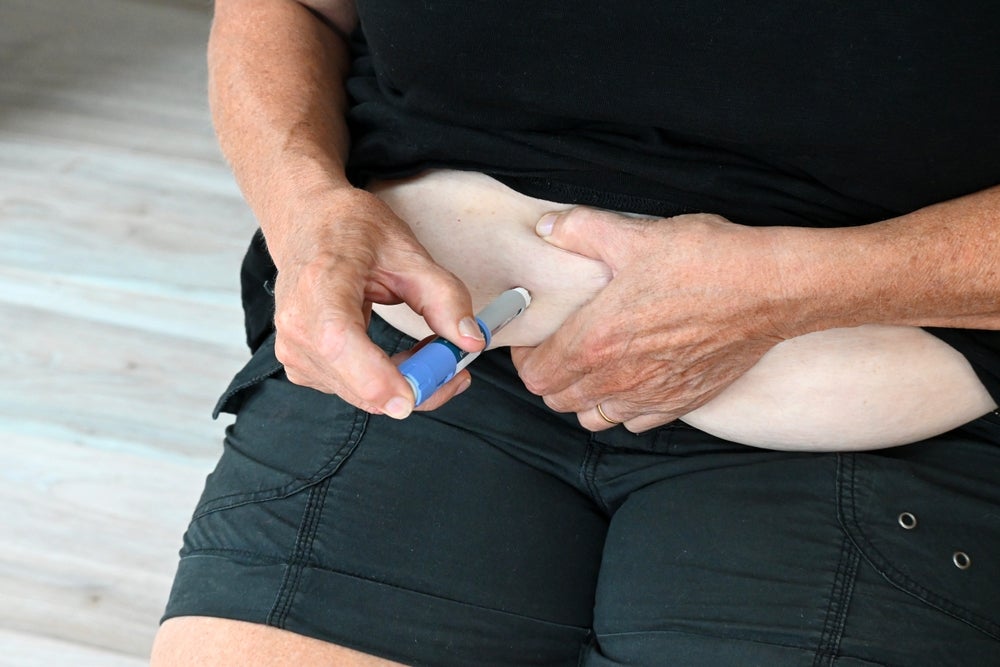The pharmaceutical industry continues to be a hotbed of innovation, with activity driven by the evolution of new treatment paradigms, and the gravity of unmet needs, as well as the growing importance of technologies such as pharmacogenomics, digital therapeutics, and artificial intelligence. In the last three years alone, there have been over 633,000 patents filed and granted in the pharmaceutical industry, according to GlobalData’s report on Innovation in Pharmaceuticals: Transgenic murine models. Buy the report here.
However, not all innovations are equal and nor do they follow a constant upward trend. Instead, their evolution takes the form of an S-shaped curve that reflects their typical lifecycle from early emergence to accelerating adoption, before finally stabilising and reaching maturity.
Identifying where a particular innovation is on this journey, especially those that are in the emerging and accelerating stages, is essential for understanding their current level of adoption and the likely future trajectory and impact they will have.
110 innovations will shape the pharmaceutical industry
According to GlobalData’s Technology Foresights, which plots the S-curve for the pharmaceutical industry using innovation intensity models built on over 756,000 patents, there are 110 innovation areas that will shape the future of the industry.
Within the emerging innovation stage, cell therapy for ocular disorders, coronavirus vaccine components, and DNA polymerase compositions are disruptive technologies that are in the early stages of application and should be tracked closely. Adeno-associated virus vectors, alcohol dehydrogenase compositions, and antibody serum stabilisers are some of the accelerating innovation areas, where adoption has been steadily increasing. Among maturing innovation areas are anti-influenza antibody compositions and anti-interleukin-1, which are now well established in the industry.
Innovation S-curve for the pharmaceutical industry

Transgenic murine models is a key innovation area in pharmaceuticals
Transgenic murine models refer to mice that have been genetically altered for the purposes of understanding the in vivo functions of genes. The gene to be studied is injected into the nucleus of a fertilised mouse egg, and becomes integrated into the genome. Transgenic murine models help researchers better understand debilitating diseases such as cancer, Alzheimer’s diseases, Parkinson’s disease, diabetes, and more.
GlobalData’s analysis also uncovers the companies at the forefront of each innovation area and assesses the potential reach and impact of their patenting activity across different applications and geographies. According to GlobalData, there are 290+ companies, spanning technology vendors, established pharmaceutical companies, and up-and-coming start-ups engaged in the development and application of transgenic murine models.
Key players in transgenic murine models – a disruptive innovation in the pharmaceutical industry
‘Application diversity’ measures the number of different applications identified for each relevant patent and broadly splits companies into either ‘niche’ or ‘diversified’ innovators.
‘Geographic reach’ refers to the number of different countries each relevant patent is registered in and reflects the breadth of geographic application intended, ranging from ‘global’ to ‘local’.
Patent volumes related to transgenic murine models
| Company | Total patents (2021 - 2023) | Premium intelligence on the world's largest companies |
| Regeneron Pharmaceuticals | 3924 | Unlock Company Profile |
| Sanofi | 481 | Unlock Company Profile |
| F. Hoffmann-La Roche | 384 | Unlock Company Profile |
| Biocytogen Pharmaceuticals (Beijing) | 224 | Unlock Company Profile |
| Omeros | 118 | Unlock Company Profile |
| Children's Medical Center | 116 | Unlock Company Profile |
| Ligand Pharmaceuticals | 102 | Unlock Company Profile |
| Jackson ImmunoResearch Laboratories | 91 | Unlock Company Profile |
| Amgen | 89 | Unlock Company Profile |
| Centre National de la Recherche Scientifique | 84 | Unlock Company Profile |
| AbCellera Biologics | 83 | Unlock Company Profile |
| Deerfield Management | 78 | Unlock Company Profile |
| Takeda Pharmaceutical | 76 | Unlock Company Profile |
| C. H. Boehringer Sohn | 73 | Unlock Company Profile |
| Bristol-Myers Squibb | 72 | Unlock Company Profile |
| E. Merck | 72 | Unlock Company Profile |
| Erasmus MC | 68 | Unlock Company Profile |
| Biogen | 66 | Unlock Company Profile |
| Crescendo Biologics | 61 | Unlock Company Profile |
| Merus | 60 | Unlock Company Profile |
| Japan Science and Technology Agency | 53 | Unlock Company Profile |
| Kirin Holdings | 49 | Unlock Company Profile |
| Homology Medicines | 47 | Unlock Company Profile |
| Sangamo Therapeutics | 46 | Unlock Company Profile |
| Encoded Therapeutics | 44 | Unlock Company Profile |
| Memorial Sloan Kettering Cancer Center | 44 | Unlock Company Profile |
| Pfizer | 41 | Unlock Company Profile |
| AstraZeneca | 40 | Unlock Company Profile |
| Helmholtz Association of German Research Centres | 39 | Unlock Company Profile |
| CSL | 39 | Unlock Company Profile |
| Massachusetts General Hospital | 38 | Unlock Company Profile |
| Transposagen Biopharmaceuticals | 38 | Unlock Company Profile |
| General Hospital | 36 | Unlock Company Profile |
| Taiga Biotechnologies | 35 | Unlock Company Profile |
| Samsung Life Public Welfare Foundation | 34 | Unlock Company Profile |
| BASF | 34 | Unlock Company Profile |
| Vivoryon Therapeutics | 34 | Unlock Company Profile |
| Academia Sinica | 33 | Unlock Company Profile |
| St. Jude Children’s Research Hospital | 33 | Unlock Company Profile |
| PhoenixBio | 33 | Unlock Company Profile |
| Shiseido | 32 | Unlock Company Profile |
| Eli Lilly and | 31 | Unlock Company Profile |
| City of Hope | 31 | Unlock Company Profile |
| OncoTherapy Science | 31 | Unlock Company Profile |
| ImmunoGen | 30 | Unlock Company Profile |
| Merck & Co | 29 | Unlock Company Profile |
| TransGenic | 28 | Unlock Company Profile |
| United Therapeutics | 28 | Unlock Company Profile |
| APEIRON Biologics | 28 | Unlock Company Profile |
| Fred Hutchinson Cancer Research Center | 27 | Unlock Company Profile |
Source: GlobalData Patent Analytics
Regeneron Pharmaceuticals is the leading patent filer in transgenic murine models. Regeneron Pharmaceuticals has a market cap of $78.64bn and is primarily focused on cancer, allergic and inflammatory diseases, eye diseases, metabolic and cardiovascular diseases, infectious diseases, neuromuscular diseases, and rare diseases. Regeneron has created its VelociSuite technology platform, which includes VelociGene, VelociMouse, VelocImmune and VelociMab. Together, these technologies increase the efficiency and decrease the time involved in the discovery and generation of drug candidates. The company’s VelociMouse technology enables the immediate generation of genetically altered mice directly from modified embryonic stem cells. In 2022, AbCellera entered into a collaboration with Regeneron for four discovery programmes based on AbCellera’s antibody discovery engine and Regeneron’s VelocImmune mice. Sanofi and F. Hoffmann-La Roche are the other key patent filers in transgenic murine models.
In terms of application diversity, Shattuck Labs is the top company, followed by Lunan Pharmaceutical Group and Candel Therapeutics. By means of geographic reach, Arrowhead Pharmaceuticals holds the top position. Ozgene and Ligand Pharmaceuticals stand in second and third positions, respectively.
To further understand the key themes and technologies disrupting the pharmaceutical industry, access GlobalData’s latest thematic research report on Pharmaceutical.
Data Insights
From

The gold standard of business intelligence.
Blending expert knowledge with cutting-edge technology, GlobalData’s unrivalled proprietary data will enable you to decode what’s happening in your market. You can make better informed decisions and gain a future-proof advantage over your competitors.







